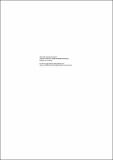| dc.contributor.author | Mirii, Ngugi Wa | |
| dc.date.accessioned | 2011-10-24T14:02:20Z | |
| dc.date.available | 2011-10-24T14:02:20Z | |
| dc.date.issued | 1979-03 | |
| dc.identifier.citation | Mirii, Ngugi Wa (1979) On literacy content. Working paper no. 340, Nairobi: Institute for Development Studies, University of Nairobi | en_GB |
| dc.identifier.uri | https://opendocs.ids.ac.uk/opendocs/handle/20.500.12413/1213 | |
| dc.description.abstract | In this paper, the word literacy means three different but interrelated concepts: literacy as acquisition of skills in reading and writing, i.e. coding and decoding information; literacy as part of man's communicative skills in production of wealth, i.e. the use of the language codes in the struggles of man against nature and in society and, lastly, literacy content as part of education to mould a certain consciousness about man's struggles against nature and in society. In pre-colonial Kenya, many forms of communication were accessible to all. With the coming of colonialism and capitalism, these pre-colonial forms of communication were suppressed and new literacy skills were introduced to limited segments of the Kenyan population.
It is argued that literacy content must reflect the everyday material reality of peasants and workers. The present content is irrelevant since it is based on the assumption that the poor are ignorant and thus to blame for their poverty. This is because literacy programmes are funded and designed by foreign agencies whose interests are totally different from the people who are affected by illiteracy i.e. peasants and workers.
The Kamirithu Community Educational and Cultural Centre is presented as an example of a literacy programme whose content was designed by its participants and where a participatory style of teaching is practised. The Kamirithu experience shows that with relevant programme content, adults can become literate within three months or less and the problem of drop-outs is eliminated. | en_GB |
| dc.language.iso | en | en_GB |
| dc.publisher | Institute for Development Studies, University of Nairobi | en_GB |
| dc.relation.ispartofseries | Working Papers;340 | |
| dc.rights.uri | http://creativecommons.org/licenses/by-nc-nd/3.0/ | en_GB |
| dc.subject | Education | en_GB |
| dc.subject | Rural Development | en_GB |
| dc.subject | Participation | en_GB |
| dc.title | On literacy content | en_GB |
| dc.type | Series paper (non-IDS) | en_GB |
| dc.rights.holder | Institute for Development Studies, University of Nairobi | en_GB |
| dc.identifier.blds | 322257 | |


